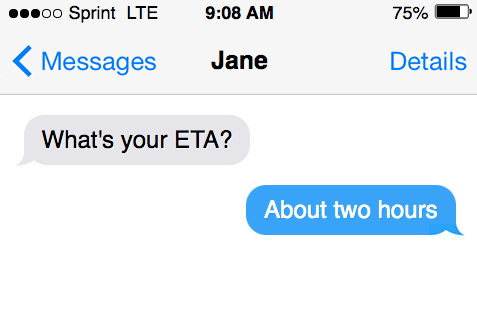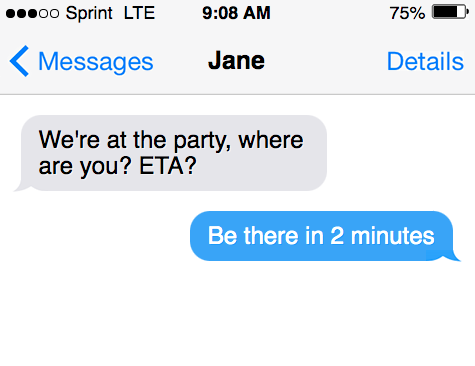What does “ETA” mean? When receiving a text message with the abbreviation “ETA,” what is that intending to communicate? “ETA” has a helpful intention behind it. Frequently used to save time and keystrokes when communicating between two people.
Learn what “ETA” means in this short guide…
“ETA” meaning and definition
“ETA” stands for “Estimated Time of Arrival.” The phrase first appeared in the airline industry. When travelers would see their destination, they would see an “ETA” associated with their travel. It would indicate to the traveler the time of arrival to their destination.
Since then, the abbreviation has made its way into the vocabulary of every American. Using “Estimated Time of Arrival” to describe someone arriving at a certain time.
Type: Noun, Initialism

Capitalization
Typically, “ETA” is spelled in ALL CAPS or all lowercase letters.
Correct: ETA
Correct: eta
Incorrect: eTA
Incorrect: eTa
Usage
More commonly, the “ETA” definition stands for “Estimated Time of Arrival.”
The use can be found in both informal and formal settings.
Social media: Instagram, TikTok, Snapchat, Twitter, and more.
Text messaging: Direct messages and group chats.
Intentions (synonyms)
Other meanings
- Electric Travel Authorization
- Euskadi Ta Askatasuna
- ETA Basque, Basque Nation (Example: “ETA is having talks with the Spanish government.”)
- Estimated Time Approximately
- Electronic Travel Authority (Australia)
History of “ETA”
The origin of “ETA” comes from the Greek ēta of Phoenician origin. Which sounds like the seventh letter of the Greek alphabet (H, η): in English transliteration, as in the etymologies of this dictionary, it is shown as ē noun. Or ḥêt from Hebrew origin. The Basque organization Euskadi Ta Askatasuna is less common in use. For example, “The Basque nationalists tried to gain independence from their nation of Northern Spain.”
According to Urban Dictionary, “ETA” had use as an abbreviation back to 2006. Most commonly, used to describe “Estimated Time of Arrival.”

Example of “ETA” in a conversation
Here are conversation examples where the definitions of “ETA” can be found:
Example one
Friend 1: “I’m going to be coming tomorrow. I should land around 2pm.”
Friend 2: “OK, can you let me know your ETA tomorrow?”
In this example, the second friend is using the “ETA” abbreviation and acronym to replace “Estimated Time of Arrival.” It is a way of asking to know when the other person is going to be arriving to a destination.
Example two
Friend 1: “I’m going to the park right now. I know we planned on meeting there. What’s your ETA?”
Friend 2: “I’m leaving my house right now. I should be there shortly.”
The second example shows a friend using “ETA” to end a sentence. “ETA” can get used in the middle, start, and end of a sentence at any time. This conversation is between two people who are attempting to coordinate arriving to a destination at the same time.
Similar short forms and abbreviations
Other similar short forms and abbreviations:
WYO: Asking someone “What You On?” This is a way of inquiring about the status of another person.
WYA: Or “Where Ya At?” This is another way of asking about where a person could be located to coordinate between two people.
Sources
Inside this article
Fact checked:
Content is rigorously reviewed by a team of qualified and experienced fact checkers. Fact checkers review articles for factual accuracy, relevance, and timeliness. Learn more.
Core lessons
Glossary
- Abstract Noun
- Accusative Case
- Anecdote
- Antonym
- Active Sentence
- Adverb
- Adjective
- Allegory
- Alliteration
- Adjective Clause
- Adjective Phrase
- Ampersand
- Anastrophe
- Adverbial Clause
- Appositive Phrase
- Clause
- Compound Adjective
- Complex Sentence
- Compound Words
- Compound Predicate
- Common Noun
- Comparative Adjective
- Comparative and Superlative
- Compound Noun
- Compound Subject
- Compound Sentence
- Copular Verb
- Collective Noun
- Colloquialism
- Conciseness
- Consonance
- Conditional
- Concrete Noun
- Conjunction
- Conjugation
- Conditional Sentence
- Comma Splice
- Correlative Conjunction
- Coordinating Conjunction
- Coordinate Adjective
- Cumulative Adjective
- Dative Case
- Determiner
- Declarative Sentence
- Declarative Statement
- Direct Object Pronoun
- Direct Object
- Diction
- Diphthong
- Dangling Modifier
- Demonstrative Pronoun
- Demonstrative Adjective
- Direct Characterization
- Definite Article
- Doublespeak
- False Dilemma Fallacy
- Future Perfect Progressive
- Future Simple
- Future Perfect Continuous
- Future Perfect
- First Conditional
- Irregular Adjective
- Irregular Verb
- Imperative Sentence
- Indefinite Article
- Intransitive Verb
- Introductory Phrase
- Indefinite Pronoun
- Indirect Characterization
- Interrogative Sentence
- Intensive Pronoun
- Inanimate Object
- Indefinite Tense
- Infinitive Phrase
- Interjection
- Intensifier
- Infinitive
- Indicative Mood
- Participle
- Parallelism
- Prepositional Phrase
- Past Simple Tense
- Past Continuous Tense
- Past Perfect Tense
- Past Progressive Tense
- Present Simple Tense
- Present Perfect Tense
- Personal Pronoun
- Personification
- Persuasive Writing
- Parallel Structure
- Phrasal Verb
- Predicate Adjective
- Predicate Nominative
- Phonetic Language
- Plural Noun
- Punctuation
- Punctuation Marks
- Preposition
- Preposition of Place
- Parts of Speech
- Possessive Adjective
- Possessive Determiner
- Possessive Case
- Possessive Noun
- Proper Adjective
- Proper Noun
- Present Participle
- Prefix
- Predicate



